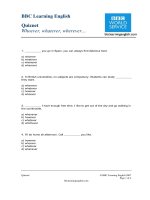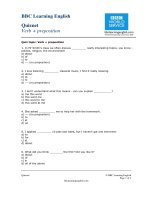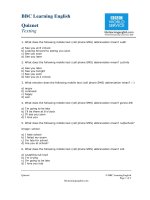Đề thi toefl tiếng anh của trung tâm BBC - 49 pps
Bạn đang xem bản rút gọn của tài liệu. Xem và tải ngay bản đầy đủ của tài liệu tại đây (23.38 KB, 4 trang )
BBC Learning English
Quiznet
Different uses of ‘Get’
Quiznet © BBC Learning English
Page 1 of 4
bbclearningenglish.com
Try the quiz online:
/>quiz=1110_get
Quiz topic: Get
1. He's been quite ill recently, but he seems to be __________ now.
a) getting better
b) getting healthy
c) getting recovered
d) getting good
2. Which is the logical order of events?
a) get engaged - get divorced - get married
b) get engaged - get married - get divorced
c) get married - get engaged - get divorced
d) get divorced - get married - get engaged
3. Which of the following forms of transport do you NOT 'get on'?
a) a train
b) a plane
c) a taxi
d) a bicycle
4. You can imagine how he reacted when she told him she'd crashed the car, he
______________ and then started shouting!
a) got really angry
b) got really sad
c) got really happy
d) got really bored
5. Do you know what time your train gets ____? Let me know and I'll meet you at the
station.
a) on
b) in
c) at
Quiznet © BBC Learning English
Page 2 of 4
bbclearningenglish.com
d) to
6. Which of the following is American English? 'Have you ever ________ lost on the New
York subway - it’s really confusing!'
a) get
b) getting
c) got
d) gotten
Quiznet © BBC Learning English
Page 3 of 4
bbclearningenglish.com
Quiz topic: Get
1. He’s been quite ill recently, but he seems to be __________ now.
a) getting better
b) getting healthy
c) getting recovered
d) getting good
a) When someone recovers from an illness, they can get well, or get better.
b) If we talk about someone getting healthy, we mean that they are changing their
lifestyle, maybe eating better and talking more exercise.
c) Someone can recover from an illness, but not 'get recovered'.
d) In this case, we need to use the adverb, well or the comparative form 'better'.
2. Which is the logical order of events?
a) get engaged - get divorced - get married
b) get engaged - get married - get divorced
c) get married - get engaged - get divorced
d) get divorced - get married - get engaged
a) You cannot get divorced before you get married - unless you are divorcing one person
to marry another!
b) This is a logical order - Did you know more over 50 year olds are getting
divorced than ever before?
c) First you get engaged, then you get married, then (hopefully not!) you get divorced.
d) First you get engaged, then you get married, then (hopefully not!) you get divorced.
3. Which of the following forms of transport do you NOT ‘get on’?
a) a train
b) a plane
c) a taxi
d) a bicycle
a) We say 'get on a train', in fact all forms of transport except a car or taxi.
b) We say 'get on a plane', in fact all forms of transport except a car or taxi.
c) We say 'get on' with all form of transport except a car or taxi.
d) We say 'get on a bicycle', in fact all forms of transport except a car or taxi.
4. You can imagine how he reacted when she told him she’d crashed the car, he
______________ and then started shouting!
a) got really angry
b) got really sad
c) got really happy
d) got really bored
a) We use 'get + adjective' to describe a change in emotion.
Quiznet © BBC Learning English
Page 4 of 4
bbclearningenglish.com
b) We use 'get + adjective' to describe a change in emotion, but this adjective is not
correct.
c) We use 'get + adjective' to describe a change in emotion, but this adjective is not
correct.
d) We use 'get + adjective' to describe a change in emotion, but this adjective is not
correct.
5. Do you know what time your train gets ____? Let me know and I’ll meet you at the
station.
a) on
b) in
c) at
d) to
a) Which verb + preposition means to arrive?
b) This verb + preposition means to arrive – 'We get in at 10:52'.
c) Which verb + preposition means to arrive?
d) Which verb + preposition means to arrive?
6. Which of the following is American English? “Have you ever ________ lost on the New
York subway – it’s really confusing!”
a) get
b) getting
c) got
d) gotten
a) What's the past participle of 'get'?
b) What's the past participle of 'get'?
c) What's the past participle of 'get'?
d) The past participle of 'get' in American English is 'gotten' – e.g. I've never
gotten married.









